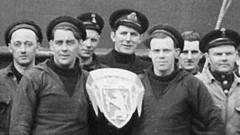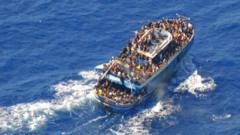As the 80th anniversary of VE Day approaches, commemorative journeys highlight the bravery behind the 'Shetland Bus' operations.
**The Untold Heroics of the 'Shetland Bus' During WWII**

**The Untold Heroics of the 'Shetland Bus' During WWII**
A look back at an extraordinary maritime mission aiding Norwegian resistance against Nazi Germany.
During World War II, the 'Shetland Bus' was an incredible covert operation that played a crucial role in aiding the resistance movement in Nazi-occupied Norway. Amid the harsh conditions of winter and under the cloak of night, small fishing vessels departed from Shetland, Scotland, embarking on daring missions to deliver critical supplies, agents, and support to resistance fighters along the Norwegian coast—a distance of 200 miles.
In a poignant act of remembrance, six of the original boats, now restored and historic, are set to embark on a commemorative journey from Bergen to Shetland. This event coincides with the 80th anniversary of Victory in Europe (VE) Day, reflecting the legacy of the heroic 'Shetland Gang' members from the 1940s.
Norway faced invasion by Nazi Germany on April 8, 1940, prompting many citizens, alongside the government and Royal Family, to flee to the UK. In response to this crisis, British Prime Minister Winston Churchill established the Special Operations Executive (SOE), aimed at conducting sabotage and espionage across Europe. The Shetland Bus became a vital component of the Norwegian SOE, completing over 200 journeys during the war.
These perilous sea crossings took place predominantly during winter months, leveraging the hours of darkness to evade German detection. The conditions were treacherous, and the risk of interception by German warplanes was always looming. Many refugees fleeing oppression were hidden in the holds of fishing boats during the return journeys back to safety.
One significant vessel, the M/K Erkna, successfully transported 60 Norwegian refugees in 1941. However, the journey was not without tragedy; a total of ten fishing boats were lost, and 44 crew members lost their lives in the line of duty.
Current skipper of the M/K Arnefjord, Morten Neset, is one of those who will participate in the poignant voyage intended to honor this legacy. "The Shetland Bus represented hope," he stated, emphasizing how vital the operation was for Norwegians feeling isolated and suppressed. Residents of Shetland played a crucial role by hosting fleeing soldiers and civilians, fostering a robust bond between Norway and Scotland.
The Liberation Convoy is scheduled to depart from Bergen on Sunday evening, May 5, and is expected to reach Lerwick by Tuesday morning, May 6. The event serves not only to honor those who fought for freedom but also to keep alive the spirit of solidarity between these two regions, proving that in the darkest of times, bravery and camaraderie can shine brightly.




















